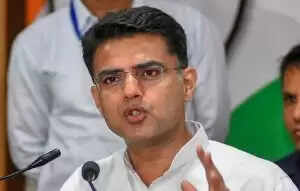Sachin Pilot Critiques Modi's Approach to US Tariffs: A Call for Strategic Action
Pilot's Strong Criticism of Government's Handling of US Tariffs

New Delhi: Congress General Secretary Sachin Pilot has sharply criticized the government for its inadequate response to the tariffs imposed by the United States. He expressed that Prime Minister Narendra Modi should have sought a more effective resolution during his recent visit instead of merely engaging in 'photo ops' and gift exchanges.
Pilot emphasized that while the global community is reacting to the US's reciprocal tariffs, the Indian government appears to be stalling and leaving matters to chance.
In a discussion with a news agency, the former Corporate Affairs Minister pointed out that the Indian administration has not even attempted to counter the tariffs imposed by the US.
"When the Prime Minister visited Washington in February and met with the US President, I expected more than just photo opportunities and gift exchanges; a constructive outcome was necessary," Pilot remarked.
"If our bilateral relations are as robust as claimed, we wouldn't be facing such steep tariffs. Our exports are bound to suffer significantly; manufacturing is already declining, and MSMEs are likely to face severe challenges. The economy is poised for considerable strain due to potential layoffs and job losses, yet we have not seen a sufficient response or guidance from the government on how to address this crisis."
Pilot accused the government of being complacent and suggested that it seems to be yielding to US pressure at the expense of Indian interests.
He noted that several European nations have reacted decisively, and China is preparing to take legal action against the US at the WTO.
While European countries have indicated similar tariff measures, Canada and Mexico are also considering reciprocal tariffs, yet India has yet to respond, Pilot stated.
"The government's intentions remain unclear, but it is evident that these trade conflicts will create significant challenges, affecting inflation, manufacturing, productivity, and technology transfer. Despite Parliament being in session, we have not received a satisfactory response or assurance from the Indian government regarding the protection of our interests. This silence only heightens uncertainty," he added.
Pilot called for a well-thought-out strategy to tackle the tariff issue, asserting that if the proposal was anticipated, the government should have communicated and managed it more strategically.
"We are essentially accepting the situation as it is, while the rest of the world is reacting, we remain unresponsive," he remarked.
He highlighted that India's economy is now more interconnected globally, and the US's actions will significantly impact India, especially during a period of unprecedented unemployment since Independence.
"Our national debt has surged dramatically, and while the economy is growing, the wealth gap is at historic levels. A significant portion of our workforce is involved in trade and export-related manufacturing, and millions of jobs are at risk. Yet, the government has not proposed any innovative solutions to address the fallout from these tariff disputes," Pilot stated.
He acknowledged the difficulty in predicting the exact consequences of the US tariffs but insisted that the Indian government should have been better prepared, given the circumstances.
Pilot concluded that India's strategic partnership with the US has not translated into tangible benefits in the current economic landscape.
The US has implemented a 27 percent reciprocal tariff on India, citing high import duties on American goods as part of the Trump administration's efforts to reduce the trade deficit and bolster manufacturing.
This move is anticipated to adversely affect India's exports to the US.
In a broader context, President Trump has announced reciprocal tariffs on approximately 60 countries to counteract higher duties imposed on American products globally.
Regarding the recently passed Waqf (Amendment) Bill, which has now become law, Pilot stated that the Congress party clearly articulated its position in Parliament, with the Opposition united in its opposition.
"The key question is why this bill was introduced in Parliament. The intentions behind it are not as claimed. If there were isolated incidents of noncompliance that needed addressing, those could have been rectified without rushing through such a contentious bill," he said.
"The manner in which the bill was pushed through, despite widespread opposition from various political parties, stakeholders, and community leaders, suggests an intent to reignite divisive debates about Hindus and Muslims, and to polarize the narrative along religious lines," Pilot added.
"This is a familiar tactic for the BJP to divert attention from pressing issues like Manipur, unemployment, food price inflation, and Chinese incursions, redirecting focus toward divisive topics that serve their political agenda," he concluded.
President Droupadi Murmu granted her assent to the Waqf (Amendment) Bill, 2025, on Saturday, following its passage in Parliament amidst intense debates.
